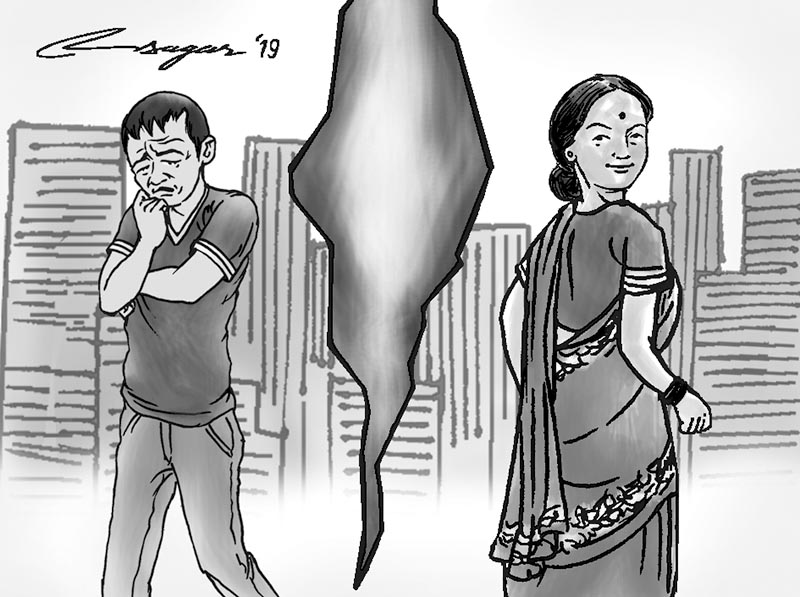Men and women: Legally unequal
Owing to the discriminatory divorce law that results in a “costly” marriage for men, the cult of live-in relationship is, in fact, imperative in Nepali society, more than it is in the Western societies. The government should, therefore, amend the divorce law
Society is dynamic, and its dynamism is and should be determined by all-round and equal growth of its two entities, i.e., men and women. When discussing about gender inequality, we end up thinking of women as being disadvantaged compared to their male counterparts. But here, I am speaking for all those Nepali brothers who have suffered as a result of the divorce law that clearly discriminates men against women.
A well-accepted fact is that in order to protect vulnerable women, we need special protective provisions in the law. But at the same time, it is our lawmakers’ responsibility to clearly define what it takes to be a vulnerable woman so that the intended law best serves its purpose. No law can be taken as popular if it turns out to be unjust for even a single person while delivering justice to the rest.
The stark inequality in the divorce law is that if a woman seeks a divorce, it is literally a process involving two days whereas if a man wants it, it can potentially drag on for years. Getting a divorce will virtually be a never-ending ordeal for a husband until the wife cooperates. So the wife legally possesses the power to make a husband’s life real hell in Nepal. It does not stop here.
The provision of alimony to be acquired from the husband’s parental property is another gut-wrenching aspect because for the husband’s parents, it is totally unfair to have to relinquish their hard-earned wealth to someone.
By no stretch of imagination can one call it a justifiable provision in our divorce law. Thanks to our women lawmakers and women’s rights organisations that seem hell-bent on creating another version of gender inequality in
the name of safeguarding women’s rights and dignity. They themselves know what and how things should be like, but they have sold their soul to
the devil.
Yes, I am angling at the fact that they are working in the interest of foreign powers that want to infringe Nepali politics and society by weakening our social cohesion and the fabric of our society in the name of religion, rights and development infrastructure. To contain the arbitrary alimony demand from a woman, our law badly needs a will system. This will be justifiable to the parents of the husband in a divorce battle as well.
For a man, marriage in Nepali society is very “expensive”, that is to say if the marriage fails, men will have to lose their parental property and the property they had earned before the marriage in the form of alimony.
Moreover, if the situation of mana-pathi (the legal agreement that a husband has to perpetually provide at least half of his income to his estranged wife if she doesn’t want the divorce) befalls on men, they will be at the receiving end for the rest of their life.
Take the example of the famous TV journalist, Ravi Lamichhane. What does a woman lose from a divorce? The readymade defensive response of a biased feminist or an ill-informed person would be: there is stigma attached to being a divorcee woman, and the prospect of remarriage of her will be slim at best. Isn’t this something to lose as a result of a divorce? No, I beg to differ on that. Women cannot have it both ways. On the one hand, they have legally got full liberalism on all fronts and have become legally equal to men, but they are getting justice through special protective rights at the cost of the justice for men on the other.
If a husband’s behaviour smacks of adultery, then the wife can divorce him, citing mental torture, but it cannot be the other way round because the husband needs to furnish evidence of sexual intercourse, the proof of which is very difficult to come by. See, what a Catch-22 situation men are entangled in!
Owing to the discriminatory divorce law that results in a “costly” marriage for men, the cult of live-in relationship is, in fact, imperative in Nepali society, more than it is in the Western societies. Therefore, the government should either amend the divorce law to make it justifiable for both men and women or give full legal recognition to live-in relationships and things thereof.
A live-in relationship will provide a unique window of opportunity to the couple to know each other. Otherwise, there will slowly be a monumental paradigm shift in the sanctity of marriage. It could potentially lead towards giving birth to misogynists in Nepali society.
I have held no grudges against women to be equal stakeholders in the family, society and country by extension. There is considerable awareness and acceptance about feminism in urban Nepali society, but the situation in the rural communities does need special attention from the government.
Here is where women need special protective rights more than anywhere else. Women in urban society are basking in the warmth radiated by the wave of feminism - something not to be looked askance at anyway. However, a large number of women have misunderstood and misused it. Extramarital affair under the veil of being a “dignified married woman” is rife in urban communities.
We all witness this, and we have no option but to shrug off the thought of anything immoral or unethical going on. If sexual liberalism encompasses cheating on your spouse and divorce for money then what kind of society are we contemplating to become?
Paudel is a teacher at Rosebud School






